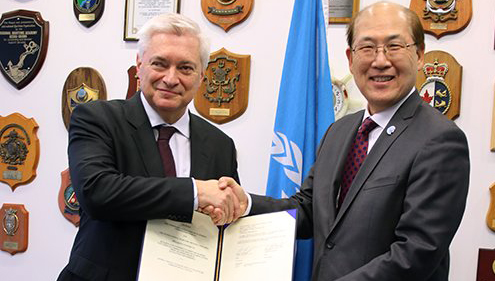Shipping encouraged to reduce plastics pollution with new GloLitter project
10 December 2019

Norway is continuing its funding of global pollution reduction projects with a new scheme to reduce and ultimately prevent marine plastic litter from shipping.
Initial funding for the GloLitter Partnerships Project is from the Government of Norway and the scheme is being executed by the International Maritime Organization (IMO) in partnership with the United Nations Food and Agriculture Organization (FAO).
The GloLitter project will develop guidance documents, training material and toolkits to help enforce existing regulations, port waste management, and the IMO's International Convention for the Prevention of Pollution from Ships (MARPOL) Annex V. Since 1988, MARPOL has prohibited the discharge of plastics, including discarded fishing gear, into the sea from ships.
The project will also consider the availability and adequacy of port reception facilities and look at enhancing awareness of the marine plastics issue within the shipping and fisheries sectors – specifically to encourage fishing gear to be marked so it can be traced back to its owner if discarded.
GloLitter is funded by Norway through Norad (the Norwegian Development Agency) which funds several projects with the IMO under a cooperation framework agreement for protecting the marine environment. This is in line with the Norwegian government's political priorities, and commitments made through the 2015 Paris-agreement to combat climate change.
These and other actions to reduce plastic litter have already been identified in IMO's Action Plan to address marine plastic litter from ships, adopted in 2018.
IMO secretary general Kitack Lim commented on the project : 'Plastic litter in the oceans is harming fish, marine mammals and seabirds and threatening the entire marine ecosystem. Our ambition is to move the maritime transport and fisheries sectors towards a future with no plastic waste entering the sea, and to share our successes with other sectors that could be encouraged to strengthen their efforts too.'
The project is intended to be a multi-donor programme, with initial funding of 40 million Norwegian Krone (about £33m) over three and a half years. Ten countries, from five high priority regions (Asia, Africa, Caribbean, Latin America and Pacific) will be selected to spearhead the project.
The GloLitter Partnerships Project also contributes to the UN global Sustainable Development Goal (SDG) 14 – to 'prevent and significantly reduce marine pollution of all kinds, in particular from land-based activities, including marine debris and nutrient pollution, by 2025'. It also follows a 'Glo-X' model from shipping industry alliances adopted for previous GloBallast, GloMEEP and GloFouling projects.
Tags
